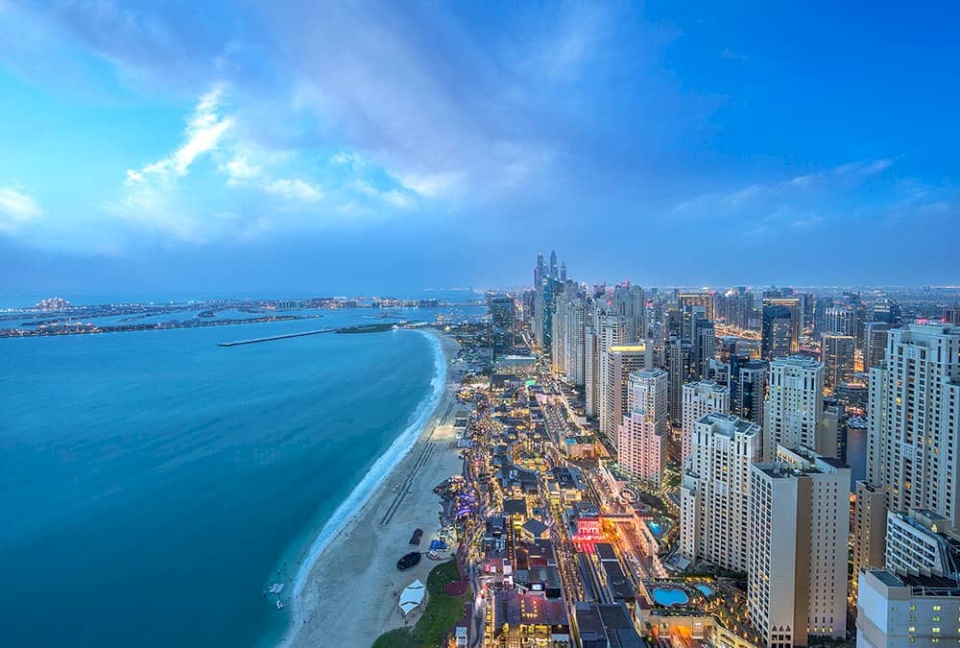
Unprecedented Real Estate Boom in Dubai and Fears of a New Bubble
SadaNews - The real estate market in Dubai is experiencing an unprecedented boom, with home sales in the second quarter of 2025 reaching the highest level ever, driven by a flow of foreign investors and a decline in the value of the dollar. However, Bloomberg sees that this rapid rise raises concerns about the possibility of repeating real estate bubble scenarios similar to those witnessed in the emirate less than two decades ago.
Among the most notable projects reflecting this boom—according to Bloomberg—is the "Ewa" project being developed by businessman Alex Zagrybleny, which features a 21-story residential tower inspired by the "Hallelujah Mountains" from the movie "Avatar".
The design is based on ancient Indian principles of "Vastu Shastra" and includes a 14-ton pyramid made of 1,450 pieces of crystal and semi-precious stones within the foundations. The prices of the apartments range from $2.7 million to $7.5 million, with 16 units sold so far.
Record Highs in Prices and Transactions
According to Bloomberg, property prices in Dubai have surged by 70% since the end of 2019, while the city witnessed 51,000 sales transactions in the second quarter alone. The total value of transactions until the end of June reached about $73 billion, which is a 41% increase compared to the same period in 2024.
This activity is partly linked to the effects of U.S. President Donald Trump’s trade policies, which led to the dollar experiencing its worst half-year performance since 1973. Since the UAE dirham is pegged to the dollar, foreign buyers, especially Europeans, benefited from higher purchasing power.
Taimur Khan, head of research at Jones Lang LaSalle for the Middle East and Africa, describes this factor as "the biggest driver of the market," adding:
"You get a huge discount, and if the dollar recovers, you'll get an additional boost in returns when you sell."
Risks of Increased Supply and Pressure on Developers
Despite the positive indicators, experts warn of risks arising from the increased supply; data from Jones Lang LaSalle indicates that about a quarter of a million housing units under development will enter the market in the coming years, representing an increase of about 30% in the total supply.
Sean Macaulay, CEO of Devmark, states that "land prices have risen to a level that puts pressure on profit margins, making it increasingly difficult to make the numbers work." The entry of a large number of new developers into the market also intensifies competition and tests the market's absorptive capacity.
Lessons from the Past Still Present
Bloomberg recalls Dubai's history with volatile real estate cycles, including the "The World" project that cost $13 billion in 2008 before its work halted with the global financial crisis, prompting Abu Dhabi to intervene to save the emirate. The market also suffered another blow in 2014 following a collapse in oil prices, which led to the postponement of major projects.
Despite these precedents, major developers like Joseph Kleindienst are moving ahead with massive projects such as "The Heart of Europe," valued at $6 billion and spread across six artificial islands. The project includes luxury hotels and innovative facilities such as the "Rainy Street," and began welcoming guests in 2024 at the "Voco Monaco Dubai" hotel.
A More Mature Market or a New Bubble?
Will McIntosh, regional partner at Knight Frank, confirms that "the market today is increasingly shaped by actual buyers rather than speculators," pointing out that less than 5% of buyers sell their units within 12 months, compared to 25% in 2008.
However, Bloomberg believes the question remains open: Is what’s happening today the beginning of a long-term growth cycle, or are we on the verge of a harsh correction that might recall previous collapse scenes?
Source: Bloomberg

Oil Prices Decline After Tehran Confirms Its Intent to Hold Negotiations with Washington

"Human Rights Watch": Israel and Washington Killed Hundreds of Civilians in Yemen in 2025

Qatar Strengthens Its Presence in the Asian Gas Market with Long-Term Agreement with Malay...

UAE Private Sector Growth Reaches Highest Level in 11 Months Boosted by Sales Momentum

Saudi Arabia and Turkey Expand Cooperation in Energy and Explore New Opportunities

Oil prices continue to rise following escalating tensions between Washington and Tehran an...

Gold Price Surpasses $5000 an Ounce with Return of Risk Appetite
